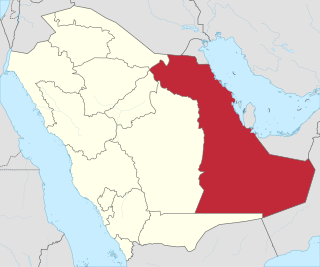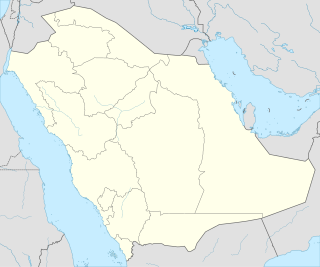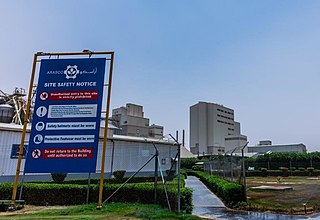
Transport in Saudi Arabia is facilitated through a relatively young system of roads, railways and seaways. Most of the network started construction after the discovery of oil in the Eastern Province in 1952, with the notable exception of Highway 40, which was built to connect the capital Riyadh to the economically productive Eastern Province, and later to the Islamic holy city of Mecca and the port city of Jeddah. With the arrival of petrodollars, the Kingdom of Saudi Arabia has initiated many infrastructure development projects across the country, and the extensive development of the transportation network has followed suit in support of various economic developments.

The Eastern Province, also known as the Eastern Region, and officially the Emirate of the Eastern Province, is the easternmost of the 13 provinces of Saudi Arabia. It is the largest province by area and the third most populous after the Riyadh Province and the Makkah Province. In 2017, the population was 4,900,325. Of these, 3,140,362 were Saudi citizens and 1,759,963 were foreign nationals The province accounts for 15.05% of the entire population of Saudi Arabia and is named for its geographical location relative to the rest of the kingdom.

Dammam is the sixth-most populous city in Saudi Arabia after Riyadh, Jeddah, Mecca, Medina and Khamis Mushait. It is the capital of the Eastern Province. With a total population of 1,252,523 as of 2020. The judicial and administrative bodies of the province, in addition to the administrative offices of other minor governmental departments functioning within the province, are located in the city. The word itself is generally used to refer to the city, but may also refer to its eponymous governorate.

Yanbu, also known simply as Yambu or Yenbo, is a city in the Al Madinah Province of western Saudi Arabia. It is approximately 300 kilometers northwest of Jeddah. The population is 222,360. Many residents are foreign expatriates working in the oil refineries and petrochemical industry, mostly from Asia, but there are also large numbers from the Middle East, Europe, and North America.

Jubail is a city in the Eastern province on the Arabian Gulf coast of Saudi Arabia, with a total population of 684,531 as of 2021. It is home to the largest industrial city in the world. It is also home to the Middle East's largest and world's fourth largest petrochemical company SABIC. It has the world's largest IWPP producing 2743.6 MW of electricity and 800,000 m3 of water daily. Jubail comprises the Old Town of Al Jubail, which was a small fishing village until 1975 and the new industrial area. Jubail Industrial City is the largest civil engineering project in the world today.

Khobar is a city and governorate in the Eastern Province of the Kingdom of Saudi Arabia, situated on the coast of the Arabian Gulf. With a population of 457,748 as of 2017, Khobar is part of the 'Triplet Cities' area, or Dammam metropolitan area along with Dammam and Dhahran, forming the residential core of the region.

Ras Tanura is a city in the Eastern Province of Saudi Arabia located on a peninsula extending into the Persian Gulf. The name Ras Tanura applies both to a gated Saudi Aramco employee compound and to an industrial area further out on the peninsula that serves as a major oil port and oil operations center for Saudi Aramco, the largest oil company in the world. Today, the compound has about 3,200 residents, with a few Americans and British expats.

Jubail Industrial City, the World's Largest Industrial City, was established in 1975 and is located in the Eastern Province of Saudi Arabia. It covers 1,016 square kilometers and includes industrial complexes and port facilities. It contributes to about 7% of Saudi Arabia's GDP.

King Abdullah Economic City is a megaproject announced in 2005 by King Abdullah bin Abdulaziz Al Saud, the former king of Saudi Arabia.
Nama Chemicals, also known as NAMA, is a Saudi Arabian joint stock Taduwal listed company established in 1992 with the objective of developing and establishing industrial projects particularly in the area of chemicals and petrochemicals.

Saudi Ports Authority is a government agency that supervises the ports of Saudi Arabia. It was founded in 1976 as an independent agency of the Prime Minister's office, to bring together the governance and operations of the multiple ports of the country to one office. Over time the actual operation of the ports was devolved by government contract to independent port operating companies.
Ras Al-Khair is a town and port currently under development on the eastern coast of Saudi Arabia 60 km north of Jubail. It is also known under its project name of "Minerals Industrial City".

The Royal Commission for Jubail and Yanbu (RCJY) was established on 21 September 1975, as an autonomous organization of the Saudi Arabian Government. The Commission is governed by a Board of Directors and its Chairman reports to the Council of Ministers. The Chairman’s office in Riyadh formulates policies and oversees implementation through two Directorates General; one in Jubail and the other in Yanbu.
King Fahd or Fahd of Saudi Arabia (1921–2005) was a Saudi monarch.

Gulftainer is a port operator with its corporate head office in the United Arab Emirates (UAE). It was established in 1976.

King Abdul Aziz Port, also known as Dammam Port, is a port in the city of Dammam, Saudi Arabia. It is the largest port in the Persian Gulf, and the third largest and third busiest port in the Middle East and North Africa (MENA) region, after the Jeddah Islamic Port. King Abdul Aziz Port is a major export center for the oil industry, and also a key distribution center for major landlocked cities in the country, particularly the capital cities of provinces, such as Riyadh which is linked to Dammam by a railway line.

ARASCO is a closed joint stock company in Saudi Arabia. It is one of the GCC’s most prominent national food companies, ranking among the 100 largest companies in Saudi Arabia. It is a privately held feed-to-food company. It is Arabian Agricultural Services Company (ARASCO), a food security enterprise and the parent company of six strategic business units. Its business is privately held by Saudi shareholders.
The King Fahad Industrial Port (Yanbu) is a Saudi port located in Yanbu city of Saudi Arabia on the Red sea coast. It is the largest port for loading the crude oil and petrochemicals in the Red Sea.
Yanbu Commercial Port is among the ancient ports on the Red Sea. Its strategic importance comes from the fact that the port is a main gateway to the Muslim holy city of Medinah. It is a natural port surrounded by land and coral reef. The port, like many other Saudi ports, has undergone many development projects since the establishment of Saudi Arabia. Currently, the port sector, including Yanbu Commercial Port, is led by the Saudi Ports Authority. Yanbu Commercial Port’s operations grow faster as in 2018 only the port operated 3.33 million tons of cargo. Moreover, the port has a special 7,200 square meters terminal to receive pilgrims.












